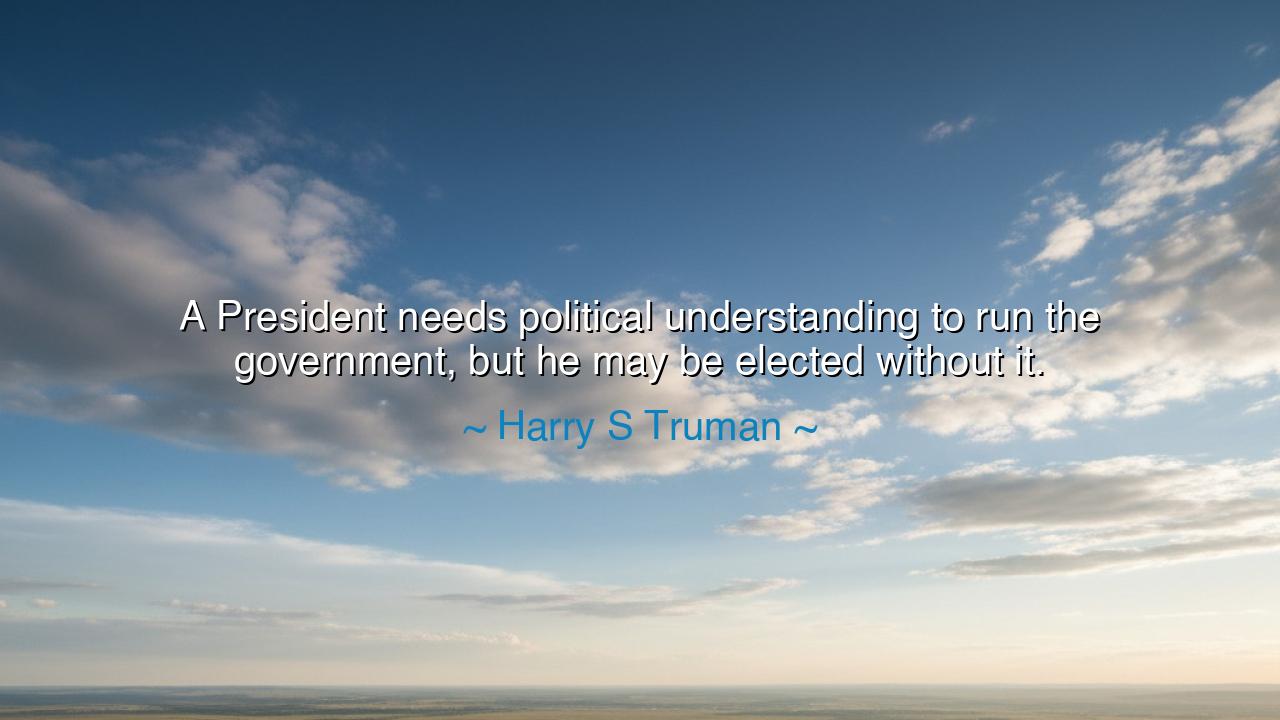
A President needs political understanding to run the government
A President needs political understanding to run the government, but he may be elected without it.






The words of Harry S. Truman echo through the corridors of power like a solemn warning carved into marble: “A President needs political understanding to run the government, but he may be elected without it.” Spoken by a man who knew the burden of leadership not from theory, but from fire, these words are both confession and caution. They remind us that election is not the same as wisdom, that the crown of office does not bestow the gift of understanding, and that the fate of nations may rest upon the character of one who must learn the art of governance while already bearing its weight.
Truman himself rose to the highest seat not through ambition but through destiny’s sudden turn. When Franklin D. Roosevelt died in 1945, Truman was thrust into a role for which he had little preparation and no forewarning. The world was still aflame with war, the atomic age loomed, and the peace to come would demand both courage and foresight. “Political understanding,” as he called it, meant more than the games of parties or the schemes of power—it was the sacred wisdom to see the hearts of men, to read the pulse of the people, and to guide the machinery of state toward justice and stability. Truman learned this not from books, but from experience, humility, and resolve. His quote is thus born of his own transformation—from ordinary citizen to leader of the free world.
In the ancient manner, we may liken Truman’s truth to the wisdom of the philosophers who warned that a king without virtue is a danger to his people. The Greeks spoke of Sophia, the wisdom that guides reason, and of Phronesis, the practical understanding that governs action. Without these, said Aristotle, even a just ruler may fall into folly. In the same way, Truman’s words remind us that the power to win elections does not guarantee the power to govern well. The crowd may choose its champion by passion, but the work of ruling demands patience, discernment, and humility before truth.
History offers us a thousand examples. Consider Marcus Aurelius, the philosopher-emperor, who ruled Rome not for glory but for duty. He did not seek power, but when it came to him, he ruled with understanding. His Meditations were not written for triumph, but for self-mastery—a reminder that a ruler must first conquer his own heart before he can guide the hearts of others. And yet, how many rulers, ancient and modern alike, have worn the laurel of election or inheritance without this understanding? Their names are forgotten not because they lacked victory, but because they lacked wisdom.
Truman’s insight, then, is both a warning to rulers and a charge to citizens. For if a man may be elected without understanding, it is because the people themselves have chosen without discernment. Democracy grants the people power not only to choose, but to choose wisely. When citizens are swayed by spectacle rather than substance, by charm rather than character, they become architects of their own misfortune. The ancients knew this well—Socrates himself lamented that democracy, without virtue, could destroy itself. Truman’s words remind us that liberty requires vigilant thought, not blind enthusiasm.
Yet his message is not despair, but hope. For understanding can be learned. Truman himself, once a humble farmer and failed businessman, grew into one of America’s most decisive and principled leaders. He made the hard choices—ending a world war, confronting tyranny, rebuilding a shattered world through the Marshall Plan, and standing firm against corruption at home. He learned, as every true leader must, that governing is not the art of pleasing men, but of serving truth. His life proves that wisdom may follow power, if the heart remains humble and the mind open to correction.
Therefore, my child of the future, learn from this: seek understanding before authority, and character before command. Whether you lead a nation, a household, or your own soul, remember that titles do not grant wisdom—discipline and compassion do. Do not crave to be chosen, but to be worthy of choice. And when you choose your leaders, look not for those who speak loudest, but for those who listen deepest. For a ruler without understanding may gain power through the vote of the people—but only a ruler with wisdom will use that power for the good of all.
Thus, as Truman teaches, power without understanding is peril, but power joined with wisdom is the guardian of freedom. Let this truth be your compass in an age of noise and spectacle: to lead is to serve, and to serve is to understand.






AAdministratorAdministrator
Welcome, honored guests. Please leave a comment, we will respond soon